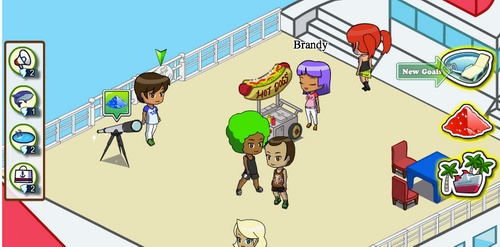每日观察:关注社交游戏领域人员流动及新作品(4.29)
1)CrowdStar(游戏邦注:其为《It Girl》开发商)日前宣布聘请Glu Mobile前高级副总裁和首席技术官Alex Galvagni担任工作室主管。这是公司2011年进军手机领域和迈向世界的战略步伐之一。CrowdStar首席执行官Peter Relan和Galvagni日前表示,公司的短期计划是开拓手机领域,将Facebook游戏推向全球市场。
作为工作室负责人,Galvagni将管理CrowdStar日益壮大的员工队伍,安排游戏的发行时间,同时他还将负责把公既有游戏推向海外市场。Galvagni表示手机领域是公司战略的重要组成部分。CrowdStar的首款手机作品是《It Girl》姐妹版本,上月初刚刚入驻App Store。CrowdStar目前是第4大Facebook应用开发商,同时是仅次于Zynga和EA的第3大社交游戏开发商(游戏邦注:CrowdStar 20款应用的MAU总计超过3100万)。
2)日本手机社交游戏网络公司/开发商DeNA日前宣布同中国在线游戏开发商/运营商NetDragon达成合作关系,共享双方手机游戏开发资源和推广平台。DeNA将为NetDragon的91Game平台推出不同版本Mobage,这一本土化的社区将提供DeNA及其内容供应商推出的手机社交游戏。而NetDragon则将运用DeNANgcore引擎开发游戏,且游戏将入驻Mobage平台(游戏邦注:这是亚洲最大的手机社交网络之一,网站拥有2050多万的注册用户)。Mobage此前才刚刚宣布同日本无线运营商NTT DoCoMo达成合作协议,将Mobage植入NTT DoCoMo智能手机和功能手机设备之中。DeNA同NetDragon合作另一目的是将Mobage平台推向其他亚洲和欧洲国家,双方希望通过达成系列合作协议共同迈向国际市场。
3)Perfect World Entertainment(PWE)(游戏邦注:其坐落于加利福尼亚州福斯特市)日前推出其首款Facebook游戏《Perfect Getaway》。PWE向来是以推出MMO游戏(《Perfect World International》)和角色扮演游戏(《Torchlight》)著称,此次推出《Perfect Getaway》堪称以身试水。游戏中玩家拥有自己的大型游轮,玩家可以自己设计游戏及聘请员工,同时为顾客提供惬意的游轮之旅,作为游轮主人,玩家能够参观异国风情和热带国家,同时收集各国纪念品。
4)在线游戏市场早前被视为细分市场,如今却已无处不在。多数游戏公司都是依靠广告营收,或一次性付费,或每月会员费。社交游戏巨头Zynga的主要营收渠道为虚拟商品交易,公司目前估值在70-100亿美元之间。其竞争对手Playdom的市场估值也不容小视(游戏邦注:Playdom以7.6亿美元售给迪斯尼公司)。
其他非社交游戏的公司估值则略逊一筹,但是投资者似乎开始意识到这些公司的潜力所在。本周估值6亿美元的Bigpoint公司融资3.5亿美元。该公司主要开发基于浏览器的MMO游戏。Bigpoint也主要是依靠出售虚拟道具创收,但与Zynga和Playdom不同,Bigpoint无需借助Facebook之类的平台。未来在线游戏公司的估值有望继续增长,特别是那些依托虚拟商品交易,而又无需借助Facebook平台的公司。
5)电子游戏公司Frogdice日前宣布截至2014年公司计划新增7名员工。Frogdice最初主要致力于开发文本角色扮演游戏,如今开始涉足社交媒介游戏。公司早前从政府部门获批8万美元的可免除贷款,主要用于购买软件和其他设备。公司去年推出了《Threshold》续作《Primordiax》,这款游戏注重画面视觉效果,是公司迈入社交媒介休闲游戏的开端。Frogdice未来几个月将推出一款名为《Coin ‘n Carry》的社交游戏。(本文为游戏邦/gamerboom.com编译,转载请注明来源:游戏邦)
1)CrowdStar Names Ex-Glu Mobile Exec as Head of Studios
It Girl developer CrowdStar announced today that Alex Galvagni, former senior vice president of global product development and CTO of Glu Mobile, joined its ranks this week as Head of Studios as part of the company’s strategy to go both mobile and global in 2011.
Following so closely on the news that Zynga formed a UK studio dedicated to mobile development, it’s not lost on us just how serious social game developers are taking the mobile space these days. EA and many other developers have had a head start on building up a mobile library that spans smartphones, feature phones and tablets compared to Zynga, CrowdStar and other social gaming companies.
Speaking to us by phone this morning, CrowdStar CEO Peter Relan and Galvagni share some of the short-term plans the company has to build on its mobile portfolio while expanding its Facebook games to the global market.
“We will be doing more mobile games that are not just companion products,” Relan says. “You can expect [the first of these] this quarter. You can expect one more major Facebook product this quarter and generally speaking one per quarter after that.”
In his role as Head of Studios, Galvagni will oversee most of CrowdStar’s swelling ranks and take charge of the games release schedule. He will also work to roll out the developer’s existing games to the global market both on Facebook and off, depending on the international territory. As for mobile, Galvagni stresses that it’s a big part of the strategy. “The focus is going to be on making good mobile products that work on the platform,” he tells us.
CrowdStar’s first mobile offering, an It Girl companion app, hit the App Store early last month. The developer is currently the fourth largest app developer on Facebook and the third largest social game developer behind Zynga and EA, with over 31 million monthly active users across all 20 of its apps.(Source:insidesocialgames)
2)DeNA, NetDragon Partner To Share Development Resources
Japanese mobile social game network/developer DeNA and Chinese online game developer/operator NetDragon announced a partnership to share mobile game development resources and distribution platforms.
As part of the agreement, DeNA will build a version of its Mobage network for NetDragon’s 91Game platform. That localized community will offer mobile social games developed by DeNA and its content providers.
NetDragon in turn will use DeNA’s Ngcore engine to create games that will be incorporated into Mobage. The mobile social network is one of the biggest in Asia, claiming more than 20.5 million registered users.
This deal’s announcement follows just a few days after DeNA announced that it’s working with Japanese wireless carrier NTT DoCoMo to integrate Mobage into the company’s smartphones and feature phones.
DeNA’s partnership with DoCoMo is also designed to promote Mobage to other Asian countries and Europe, as the two plan to collaborate with mobile operators and game developers, as well as their respective subsidiaries and partners in foreign markets to expand it internationally. (Source:Gamasutra)
3)Perfect World Entertainment’s first Facebook game finds a Perfect Getaway
You probably would have never imagined that the perfect getaway would be right inside your browser. But here it is … literally. Foster City, Calif.-based Perfect World Entertainment (PWE) has released its first ever Facebook game, Perfect Getaway, Social Times reports. Known for publishing massively multiplayer games (MMOs) like Perfect World International and roleplaying games like Torchlight, PWE is treading deep, uncharted waters with Perfect Getaway. In the game, players take control of a major cruise ship, customizing it and their staff while taking patrons on relaxing cruises. As the head of your own cruise ship, you’ll visit exotic, tropical locations such as the Caribbean, Cuba and Jamaica while collecting souvenirs and other sea-bound activities.
“We’re excited to get into Facebook games and we feel that the market is still growing and we feel like we want to hit the mainstream Facebook gaming market with high quality products,” Jason Park, GM of Perfect World, told Social Times. PWE also hinted that, since PWE is traditionally a hardcore MMO developer, that more hardcore features are going to find their way into Perfect Getaway. According to Social Times, there a bunch more features to look forward to in Perfect Getaway:
In summary Perfect Getaway includes:
Personalize your Captain! – Become the Captain of your very own cruise ship. Choose from a wide variety of outfits and hairstyles to make your Captain truly yours.
Hire your Friends to be part of your Crew – Invite your friends to join and work on your cruise ship! Earn money by managing your service stations.
Keep your Passengers Happy to Succeed – New passengers will board your cruise ship at every port. Keep them happy to get a perfect cruise rating.
Decorate your Cruise Ship – Customize your cruise ship by changing hull styles and adding decorations to your boat.
Set Sail to Real Landmarks and Destinations – Travel to real locations to collect special souvenirs at each dock. Collect all of the souvenirs to unlock a special item. (Source:Games.com)
4)Valuations For Online Game Companies Going Up Fast
For the past 5+ years I have been working with Spil Games and I have seen the online game company grow from a small start-up to a profitable international 300-person company. At the same time the online game market has also grown tremendously. When I first looked at online gaming back in 2005 it was still considered a niche market: people played games on consoles or downloaded them to their PCs, playing games in a browser was still in its infancy. At that time most people hardly ever played online games, it was considered something for kids or geeks.
Times have changed though, nowadays online games are everywhere. Especially social games like Farmville managed to get a lot of new people to start playing games. In the early days social networks helped the growth as well: if your friends invite you to play a game the chance that you will try out the game is a lot higher.
Traditionally most game companies either earned money through advertising, through a one-time payment (“download this game for USD 19,99″) or by charging a monthly subscription fee. But social games changed that completely, suddenly free-to-play games became massively profitable because players were willing to make small payments for virtual goods. Leading social game developer Zynga makes tons of money on virtual items and is currently valued between USD 7 and 10 billion.
Zynga valuation is an obviously an outlier. Despite not ‘owning’ any of its players (almost all their players play their games on Facebook, so they are heavily dependent on them) they still manage to get a huge valuation because they are able to make the exact games that people want to play and that people are willing to spend money in. Competitors like Playdom that also specialize in developing social games, and who don’t own their players either, also get high valuations: Playdom was sold to Disney last year for USD 760 million.
But for non-social game companies valuations so far where a bit lower. It seems that may be changing though and that investors are starting to realize the potential of these companies. This week it was announced that Bigpoint raised a USD 350 million round at a USD 600 million valuation. The company is not a social game company but focuses on browser based MMO (=massive multiplayer online) games, that are free to play. Bigpoint earns its money with virtual items as well, just like Zynga and Playdom. The big difference is that Bigpoint owns most of its users and is not dependent on a site like Facebook.
I expect that valuations for many other online game properties will go up in the near future, especially for those companies that get a large part of their revenues from virtual goods and that are not dependent on Facebook for their traffic. It will be interesting to see at which valuation these companies are able to raise rounds – or are snapped up by players like Zynga looking to have their own traffic! Based on what I am hearing in the market the revenues of many of these players are doubling every year because of virtual items (just like Bigpoint) and I won’t be surprised to see a billion dollar IPO for one of them within the next 18 months.(Source:businessinsider)
5)Lexington video game company expanding
Frogdice, a homegrown Lexington video-game company, announced Thursday that it plans to hire seven new employees by 2014.
The company, which began by developing text-based role-playing games and now works on social media games, was awarded an $80,000 forgivable loan by the state to help it buy software and other equipment.
“This is really exciting,” said President and CEO Michael Hartman, who founded the company in 1994. “In the last year or two, we’ve grown into a much more mature company. Before, we were just a game. Now we’re much more a company.”
The company traces to Hartman’s time in law school at the University of Georgia, where he began developing a text-only role-playing game called Threshold.
“In the classic entrepreneurial spirit, I thought I could build a better mousetrap,” he said.
He taught himself computer programming and soon found that he liked it much more than the law.
“I eventually just said that I really hate being a lawyer, and I really love making games,” he told the Herald-Leader in 2009.
The game contained the elements of any standard role-playing game: quests, leveling up characters, purchasing goods and more. Players join guilds, or clans, and try to become the most influential. They also take part in a religious system.
By 1996, he was full-time in the video game business, continuing to manage Threshold as it evolved. He met his wife, Pang, the company’s vice president and creative director, while playing Threshold in 1998. They moved to Lexington in 2004 to be closer to her parents.
Last year, the couple and their small staff of freelancers worldwide released a follow-up to Threshold called Primordiax, which began featuring some graphics. They have since turned more to casual games like those popular on social media sites such as Facebook. In the next few months, they expect to launch one called Coin ‘n Carry.
“It’s a full Web browser game in which you’re a medieval shopkeeper and sell products,” Hartman said Thursday. “The core is a whole bunch of mini-games. It’s very casual and friendly.”
Working in their home in Lexington, the couple manage the company full-time and make money off users paying for items and other features in their games.
The first of the couple’s new full-time employees, who will have an average salary of about $49,000 annually, will be an artist they’ve used in Maryland who plans to move to Lexington.
They also plan to look locally for computer programmers and artists and are seeking venture capital funding for office space, Hartman said Thursday.
Hartman complimented the Bluegrass Business Development Partnership, which includes the city, Commerce Lexington and the University of Kentucky,
“Talking with them and working with them was a huge help,” Hartman said. (Source:kentucky)










































 闽公网安备35020302001549号
闽公网安备35020302001549号